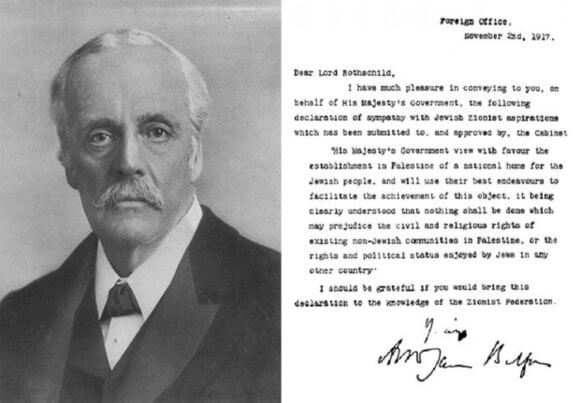Jeremy Ben-Ami of J Street has a video primer on the history of the conflict that while obviously from a liberal Zionist perspective (“the Temple Mount”), is good on the unfairness of Trump’s deal of the century, showing that Palestinian areas would be connected by a “spaghetti” of roads.
I like Ben-Ami’s explanation of the British Balfour Declaration of 1917.
It’s one of those things that is absolutely key to understanding this. The British in the course of fighting World War 1 were looking for the support domestically in the U.K. of the Jewish community and there was a desire to offer and to promise to that community something that they wanted in order to have their support for the war effort. And one of the promises that was made was by Lord Balfour to the Jewish community, that in fact the entirety of the British Mandate would be a national homeland for the Jewish people.
And it is a promise, it is on the record. The only real problem is that at the exact same time the British were promising it to the Jews, there was a whole set of correspondence from the Foreign Office going on with the Arab families, the leading families, the ruling families down in Arabia, promising the exact same land as a national home and an Arab state, and that of course, when the war was over, the control and power would be handed over to the Arab population.
So there were very conflicting promises. For the Jewish community, the Balfour Declaration has taken on epic and biblical propoprtions. The McMahon correspondence in the same time with the Arabs was not quite as well known in our history books.
This is a good, straightforward answer. The British regarded the Jewish population as significant to the war effort, enough to want to buy their support with a big colonial gift. And in fact the British were in competition with the Germans on this score.
There is a great deal of denial about this realpolitik in academic quarters. During the centennial of the Balfour Declaration, I heard a lot of arguments about British settler colonialism and the British being fooled by antisemitic theories of Jewish power, or wanting to get rid of the Jews, not to mention the personal magnetism of Chaim Weizmann to waltz into the British power circle and convince them about the need for Zionism.
No, the Balfour Declaration was the act of a colonial overlord trying to please an influential minority inside the country, a minority British leaders perceived to be Zionist. The Brits presumably knew what they were doing. They were experts at the great game. We can debate why they saw the Jewish community as significant, whether it was international finance and the ability to provide bonds, or the newfound powers of the international press. And yes, there may have been some exaggeration of Jewish powers.
Yet Ben-Ami’s point stands, the British wanted the Jewish community on their side. As vulnerable as Jews were in Europe, they also had some agency. They had a strong Zionist lobby in England and in the U.S., where Louis Brandeis converted to their cause and shepherded the Wilson administration’s endorsement of Balfour. That lobby remains an important factor in western policymaking to this day. Ben-Ami is part of it.
P.S. Rashid Khalidi calls the Balfour Declaration a “declaration of war” on Palestine in his new book “The Hundred Years War on Palestine.” He writes:
“Among [the declaration’s] many motivations were both a romantic, religiously derived philo-Semitic desire to ‘return the Hebrews to the land of the Bible, and an anti-Semitic wish to reduce Jewish immigration to Britain, linked to a conviction that ‘world Jewry’ had the power to keep newly revolutionary Russia fighting in the war and bring the United States into it.”



Also:
“As the highly respected American lawyer and diplomat Sol M. Linowitz wrote: “… the [Balfour] Declaration was legally impotent. For Great Britain had no sovereign rights over Palestine; it had no proprietary interest; it had no authority to dispose of the land. The Declaration was merely a statement of British intentions and no more.” (“Analysis of a Tinderbox: The Legal Basis for the State of Israel.” American Bar Association Journal XLlll l957, pp.522-3)
“The British government’s promise to use its ‘best endeavours’ to facilitate the Zionist project in Palestine amounted to a promise to give to the Zionists what England did not have, in violation of the established legal maxim Nemo dat quod non habet (nobody can give what he does not possess).” (Prof. Adel Safty, From Camp David to the Gulf, p. 12)
Even Chaim Weizmann knew the Declaration had no legal status: “The Balfour Declaration of 1917 was built on air.” (Mallison, “The Balfour Declaration,” in The transformation of Palestine: essays on the Origin and Development of the Arab-Israeli Conflict, ed. by Abu-Lughold; Northwestern University Press, 1971 p. 85)
“By agreeing to the creation of a Jewish “national home” in Palestine, and also guaranteeing “the rights and political status” of Jews outside Palestine, the Balfour Declaration in effect proposed to “[give] the Jews the homeland of another people while safeguarding their own rights in their countries of origin!” (Sami Hadawi, Bitter Harvest, p. 13.)
“Lord Balfour says ancestor would see treatment of Palestinians as ‘unacceptable’…“I’m sure Arthur would say ‘this is unacceptable,’ that there’s got to be more help for the Palestinians,” the banker said in reference to his great-great-uncle Arthur Balfour’s 1917 missive….”
https://www.timesofisrael.com/lord-balfour-says-ancestor-would-see-treatment-of-palestinians-as-unacceptable/
I disagree. There is no reason to believe that it was to gain the support of the Jewish community for the war in this country.
a. Russian immigrants in the East End weren’t by and large Zionists but they did hate Czarist Russia. They weren’t going to support the war effort for the sake of this. British Jewry, apart from the petit bourgeoisie was opposed to Zionism. This argument falls on this alone.
b. Secondly it was the fag end of the war. Why now?
c. The answer is staring you in the face. Britain wanted a friendly settler state vs the French and others adjacent to the Suez Canal to protect the strategic route to India, the jewel in the crown of the British Empire. That’s why France and Germany also supported the idea of a Zionist state. Britain was in competition with them.
Of course, Balfour Dec may have served a number of purposes and its authors may have had a number of motivations. On purposes,
– I have read respectable sources add that Balfour et al. hoped to undermine the loyalty of German Jews to the German war effort; similarly, for other Jews involved in the war — or possibly going to get involved — the Dec in theory would strengthen loyalty of those on the British side and undermine those on the other side (except for the many thoughtful Jews who opposed Zionism in Britain and elsewhere).
– Also, bringing the Zionists into the picture for Palestine would tend to impede French abilities to claim that area in the post-war, whether under the secret Sykes-Picot Agreement or otherwise.
– Possibly, Christian Zionists, who actually pre-dated Jewish ones, were considered on this, including Darbyite apocalyptic Dispensationalists.
On motivations,
– PM Lloyd George was an Evangelical who seemed to be to some degree a sentimental Zionist.
– Balfour clearly had anti-Semitic prejudices and may with others have liked the idea of setting up a place where British Jews and other European Jews would re-locate, thus no longer cluttering up the British scene. Herzl and Max Nordau, his right hand, liked to appeal to European nationalists with this suggestion.
Sadly the Balfour Declaration gained status and a spurious legality when it was adopted by the League of Nations as a constituent part of the mandate over Palestine granted to the UK after the war.
The BoD in London also warned (prophetically!!) of the dire consequences of the Zionists’ making a pretence of nationality out of their religious adherence.
I have for a long time been bemused by the absence of any mention of money, banking, even the name of the addressee of Balfour’s letter from much discussion of its import. (I guess any such would be taboo.) Perhaps Balfour just wanted to ensure the
moral
support of the Jewish community for the war effort, though how he thought he could accomplish this by flying in the face of the views of the majority of that community as represented by the BoD etc.I don’t know.